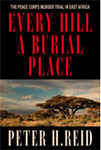EVERY HILL A BURIAL PLACE by Peter Reid (Tanzania)
On March 28, 1966, Peace Corps personnel in Tanzania received word that volunteer Peppy Kinsey had fallen to her death while rock climbing during a picnic. Local authorities arrested Kinsey’s husband, Bill, and charged him with murder as witnesses came forward claiming to have seen the pair engaged in a struggle. The incident had the potential to be disastrous for both the Peace Corps and the newly independent nation of Tanzania. To this day, the high stakes surrounding the trial raise questions as to whether there was more behind the final “not-guilty” verdict than was apparent on the surface.
Peter H. Reid, who served as a Peace Corps volunteer in Tanzania at the time of the Kinsey murder trial, draws upon his considerable legal experience to expose inconsistencies and biases in the case. He carefully scrutinizes the collection of evidence and the ensuing investigation, providing insight into the motives and actions of both the Peace Corps representatives and the Tanzanian government officials involved. Reid does not attempt to prove the verdict wrong, but critically examines the events of Kinsey’s death, her husband’s trial, and the incident’s aftermath through a variety of cultural, political, racial, and gendered points of view.
This compelling account sheds new light on a notable yet overlooked Cold War-era incident involving non-state actors. Meticulously researched and replete with intricate detail, Every Hill a Burial Place explores the possibility that the course of justice was compromised and offers a commentary on the delicacy of cross-national and cross-cultural diplomacy.
“Every Hill a Burial Place combines the suspense of a fictional legal thriller with a fascinating look at the early days of the Peace Corps in Africa. I enjoyed it as a former criminal defense attorney, a writer of legal thrillers and a former Peace Corps Volunteer who served in Africa at the time of the trial.” Phillip Margolin, New York Times Bestselling author of A Reasonable Doubt and a Returned Peace Corps Volunteer, Liberia, West Africa 1965-1967
“Peter Reid transforms the gripping story of a Peace Corps volunteer death and the acquittal of her husband into an epic study of the Peace Corps from its first days during the Kennedy administration to the present. And, the fact that he successfully places this human tragedy within the complicated and troublesome days of Cold War and after makes the book a stunning achievement. It is an amazing, suspenseful report about two young American volunteers in Tanzania that also deepens our understanding of the Peace Corps, America and their entangled history for the last six decades.”—David Rudenstine, dean emeritus of the Benjamin N. Cardozo School of Law at Yeshiva University. Author of The Day the Presses Stopped and The Age of Deference.
“An authoritative analysis of a personal tragedy in Tanzania that threatened the survival of the Peace Corps in its earliest days. The stakes could not have been higher, and Reid captures with great skill the impact of a complex family drama on the Corps and its relationship with a host country.”—Carol Bellamy, former director of the Peace Corps and former Executive Director of UNICEF.
“Peter Reid’s account of the 1966 Tanzanian murder trial of Peace Corps volunteer Bill Kinsey is suspenseful and gripping. It is also a careful, judicial examination of the difficulties the Peace Corps faced in balancing its responsibilities to the deceased, the accused, and to US relations with Tanzania. Both the research and presentation are masterful.”—John Hamilton, former US ambassador to Peru and Guatemala
“The violent death of a Peace Corps teacher in Tanzania has shocked, saddened, tantalized, and perplexed the Peace Corps community for over 50 years. Was Peppy Kinsey’s death a horrific accident, or did her husband Bill batter her to death, as some African witnesses claimed? Exhaustive, coherent, thoughtful, and suspenseful, Peter H. Reid’s account of the Kinsey murder trial and its aftermath could well be the final word on this dark event — unless, of course, this remarkable book triggers even newer revelations.”—Richard Lipez, author of the Donald Strachey series and Peace Corps teacher in Ethiopia (1962-64)
•
 Peter H. Reid, retired founding director of the Community Law Clinic at Stanford Law School, previously served for more than thirty years as executive director of the Legal Aid Society of San Mateo County. He lives in Olympia, Washington and Santa Cruz, California with his wife Barbara.
Peter H. Reid, retired founding director of the Community Law Clinic at Stanford Law School, previously served for more than thirty years as executive director of the Legal Aid Society of San Mateo County. He lives in Olympia, Washington and Santa Cruz, California with his wife Barbara.
 Every Hill a Burial Place: The Peace Corps Murder Trial in East Africa
Every Hill a Burial Place: The Peace Corps Murder Trial in East Africa
Peter H. Reid (Tanzania 1964-66)
Publishing in September
The book is now available for preorder on Amazon
Could the timing be worse? All Peace Corps volunteers have just been disappeared from their countries of service to protect them from harm’s way re the Corona Virus.
And now we have a book about the death, possibly murder, of a good and gentle Peace Corps volunteer in 1966 named Peppy Kinsey. Nowhere in the description of the book, and the reviews to follow is the least bit of sympathy expressed for this young woman. “The incident had the potential to be disastrous for both the Peace Corps and the newly independent nation of Tanzania.” It was disastrous for Peppy Kinsey. I am feeling crushed at what misery the book will bring to Peppy’s family and friends.
Maybe the timing was intentional.
You need to take a chill pill. I’m going to read the book and see for myself it’s worth. You condemn without evidence the hard work of a good man. That you suggest that he intended to do harm says far more about you than it does about him.
Why not disclose more of the book so we can come to some closure on this tragedy. not many are going to read it. Aren’t we already rife with conspiracy theories on celebrated figures. Where are the literary critics from the peace corps. we have every other profession among us, don’t we.
The book is scheduled for release in September 2020. I’m sure it will be reviewed and discussed here. If nobody beats me to it, I’ll write a review!
Dan – this article is just a teaser to get you to read the book. If they put in a complete description you wouldn’t have to buy it to find out what happened.
Many memories of Tanzania and the events in the Arusha Region. Jambo, Leon..
Katy Newlin, RPCV Arusha
Is this the Leon Parker who was the very competent administrative assistant in the Dar es Salaam
Peace Corps office in 1967? I was a volunteer in Tanzania from 1965 to 1968. I had briefly met the couple, who seemed happy but I have no direct knowledge of the case.
Mary-Ann Tirone Smith
You might want to read a book before you condemn it. Many of Peppy’s classmates, friends,
and relatives provided interviews, letters, and suggestions as well as read the manuscript in
whole or in part. In May 2019 the University Press of Kentucky agreed to publish the book
in September 2020.
Per Publishers Weekly, which favorably reviewed Every Hill A Burial Place on July 7, Reid concluded that although Peace Corps officials “presented a neutral position to the public,” they went all out to support Bill’s case and did little to look at it from Poppy’s side.
(I have no connection to the Peace Corps other than an exceptionally smart and capable pal who was a teacher in Malawi.)
I was a PC volunteer in Malawi at the time of Poppy’s death and heard gossip that a volunteer in Tanzania had pushed his wife off a cliff to kill her but was caught when a number of villagers witnessed the act. I never heard anything more about it until a friend alerted me to Reid’s book. Meanwhile, I had been haunted by the image of an act of murder witnessed by local people (who are often invisible to westerners when they are working their farms) and had written a novel based solely on my imagination. Its narrative is far from the nonfiction account that Reid so professionally presents, yet it offers up the range of opinions that have to have been expressed by people who knew of the case at the time. My working title is The Fallen. Watch for it.